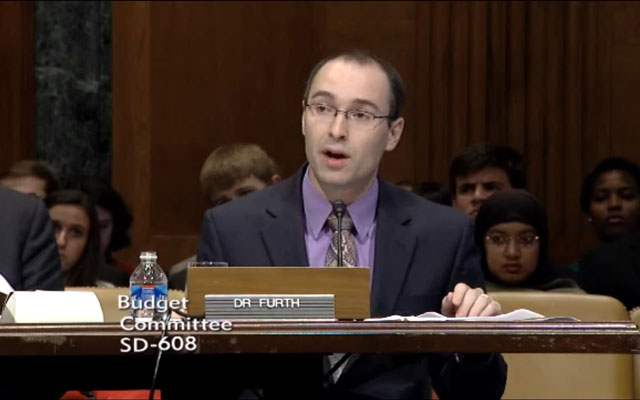For the Record: Tax Increases Are Harmful, but Europe Has Pursued Them Anyway
Rea Hederman /
Heritage economist Salim Furth gave testimony last week to the Senate Budget Committee, reminding the Senators that economic research shows that deficit reduction should be pursued through spending cuts, not tax increases. Now he has responded to written questions in detail and explored the exemplary 1990s budget cuts.
There is a long record of empirical research showing that spending cuts are less damaging to the economy than tax increases and that the benefits of spending cuts often exceed the costs. Furth cited more than a dozen academic papers stretching back to 1990 in support of this argument.
Those who want to increase U.S. government spending rely on a selective reading of recent history in Europe. They claim that Europe has undergone major spending cuts and some tax increases and that its current economic troubles are a result of falling government spending. But the actual data show that the “spending cuts” are relative to high recession-era stimulus spending: In most European countries, spending is still higher than it was before the recession—both in real terms and as a share of economic output.
As Furth clearly showed, taxes have risen sharply in several European countries as they try to close the budget gaps created by large spending increases. While one shouldn’t draw conclusions from one datapoint, an accurate reading of recent history threatens the pro-spending narrative.
Senator Sheldon Whitehouse (D–RI) responded to Furthby questioning his honesty. Senator Whitehouse claimed that projected spending cuts had already occurred, citing what he called “the OECD’s own data.” However, that “data” was actually the Senator’s own miscalculation that’s contradicted by the OECD’s published calculation—and it was not “data” at all but mostly projections of planned spending cuts as reported by various governments for various years. As we know all too well in this country, promised spending cuts almost never materialize but are most often postponed or repealed altogether.
Furth has now responded to the Senator’s written questions in detail, including an extensive documentation of his empirical analysis. Anyone who wants to replicate Furth’s calculations and verify his honesty can easily do so.
In particular, the Senator asked Furth about the U.S. experience in the 1990s, when budget cuts preceded one of the great economic booms in American history. Economic growth in the 1990s is a great example of the differential performance of the economy following spending cuts versus tax increases: Much stronger growth followed spending cuts, while much weaker growth followed tax increases.

